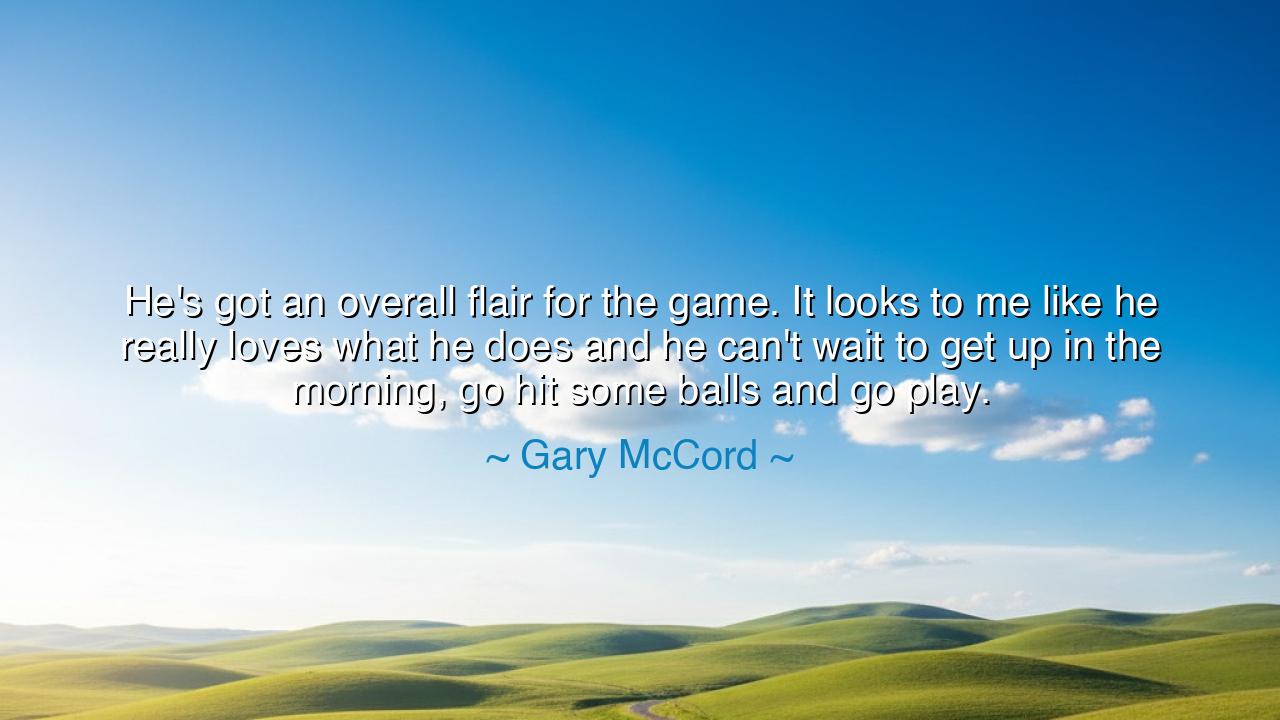
He's got an overall flair for the game. It looks to me like he
He's got an overall flair for the game. It looks to me like he really loves what he does and he can't wait to get up in the morning, go hit some balls and go play.






Gary McCord, a man who has spent his life watching and reflecting upon the spirit of the game, once spoke these words: “He’s got an overall flair for the game. It looks to me like he really loves what he does and he can’t wait to get up in the morning, go hit some balls and go play.” At first glance, these words describe an athlete’s joy, a player’s passion. But beneath them lies a profound truth, a lesson not only for athletes, but for all who labor and strive: the greatest gift is not merely talent, but the union of skill with love, of discipline with delight.
The first part of McCord’s words speaks of flair. To have flair is not just to play with competence, but with a spirit that seems to shine beyond mechanics. It is the difference between one who strikes the ball as a duty and one who strikes it as an expression of their very being. Flair comes when talent is not shackled but liberated, when discipline and creativity meet. This is why it enchants the onlooker—because it is more than sport, it is art in motion.
Yet McCord also reveals the root of this flair: love. “It looks to me like he really loves what he does.” Here lies the secret. No amount of practice alone can give birth to brilliance unless there is love for the craft. To rise in the morning eager, not dreading the work but yearning for it, is the true sign of greatness. Love transforms repetition into joy, sacrifice into pleasure, and fatigue into fuel. Without love, the game becomes labor; with love, labor becomes play.
History abounds with examples of this truth. Consider Leonardo da Vinci, who painted not because he had to, but because he could not resist the compulsion to create. He would rise early and work late, not driven by obligation but by fascination. Likewise, Michael Jordan, whose passion for basketball made him return to the court again and again, even after retirement, because he loved the game too deeply to walk away. Both men remind us that when we align ourselves with what we love, our work ceases to be toil and becomes instead an expression of our soul.
McCord’s words also teach us that joy is not a distraction from success, but the very key to it. Many imagine that greatness is born only from suffering, from grim determination. But the athlete who loves his craft has a wellspring of energy that no reluctant worker can match. To “get up in the morning” eager for the day’s work is to live already victorious, for each sunrise brings not burden but opportunity. This is the spirit that sustains excellence for years, when mere willpower would long ago have broken.
The lesson, then, is clear: find what you love, and give yourself to it wholly. Do not chase only money, or fame, or the approval of others, for these are poor fuel and quickly spent. Seek instead that which makes you rise in the morning with joy, that which you cannot help but return to. In that lies your flair, your gift to the world, your art in motion.
So I say to you: heed Gary McCord’s insight. Whether in sport, in work, or in life, let your days be guided by love for your craft. For if you love what you do, you will never merely labor—you will play, you will create, you will shine. And others will see in you not just skill, but flair, and through you they will remember the ancient truth: that the highest greatness is not found in grim toil, but in joyful mastery.






AAdministratorAdministrator
Welcome, honored guests. Please leave a comment, we will respond soon